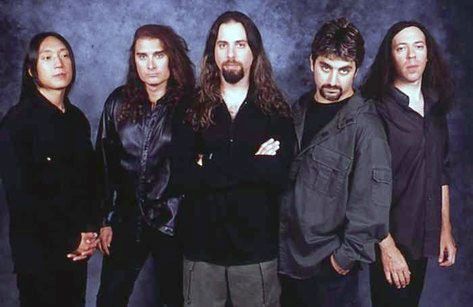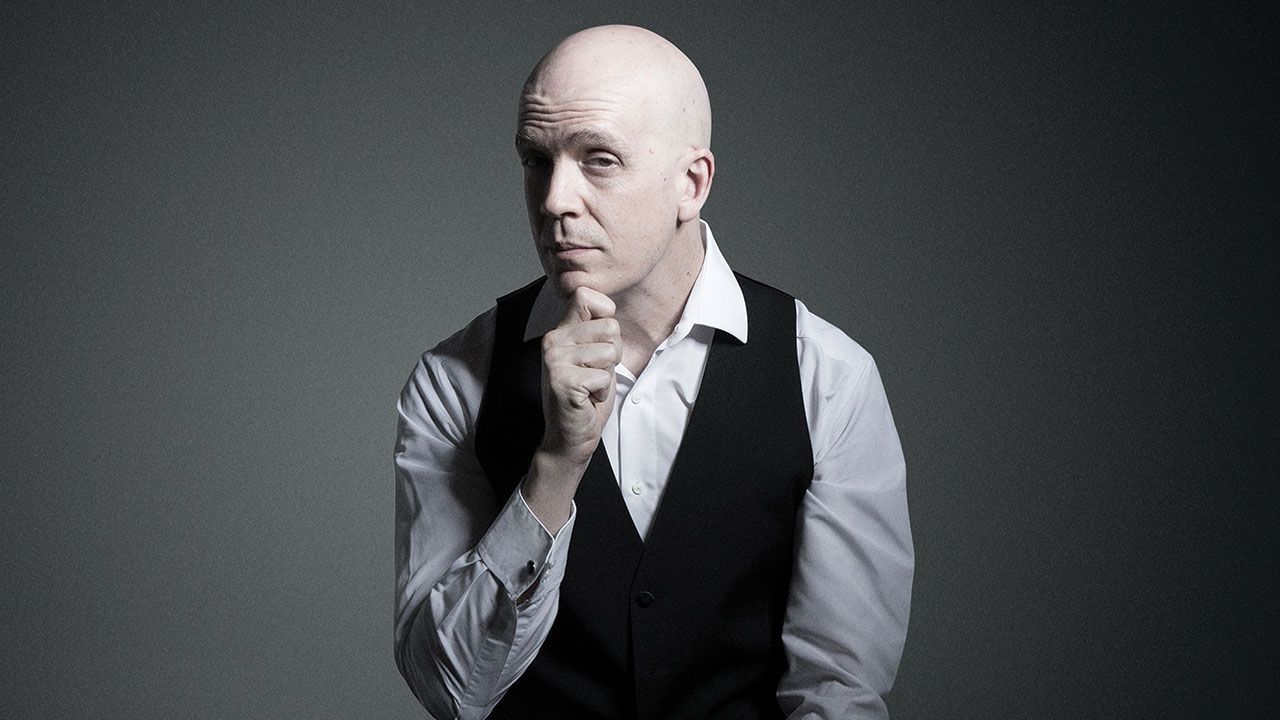Listen To KEVIN DUBROW Singing SCORPIONS “Big City Nights”; One Of His Last Ever Recordings
Kevin DuBrow passed away in 2007 at the age of 52. Kevin was best known as the lead vocalist of

Welcome to another edition of Versus, the series where we look at two releases in heavy metal history and compare them to each other and see which one was the better record.
On this edition of Versus, we are getting technical and progressive with a progressive metal matchup for the ages. One band, who has been the definition and the prime example of progressive metal. The other, a man who is creating an eclectic and diverse version of prog metal on a major scale and impressive musicianship since his first solo release almost 26 years ago. Let’s see who is the grand champion of prog, in this battle i’m calling “The Pinnacle of Prog.”

In this corner, we have progressive metal legends Dream Theater with their fifth album, 1999’s Metropolis Pt. 2: Scenes From A Memory. A progressive metal and rock classic, the band shows on this album their proficiency, musical talent and prodigy-esque know-how of musical theory. Cementing the band as one of the most technically proficient musicians in metal. A sequel to the song “Metropolis—Part I: 'The Miracle and the Sleeper” off the band’s 1992 breakout album Images and Words, let’s dissect this record, and understand what makes this a progressive classic.
The album opens with "Scene One: Regression," with an opening talking section, that almost sets up a fourth wall break in a way. Setting the listener up to get into the mindset and feeling for the album. Then the album starts with “Scene Two: I. Overture 1928”, an instrumental piece. With intricate playing by guitarist John Petrucci, and accompaniment by piano played by Jordan Rudess, their merging of playing adds a unique and complex musical marriage to the track. With drummer Mike Portnoy’s drum fills accenting their playing as well. This instrumental, and another we will talk about later, shows the band at its best. With impressive musicianship & complex technical playing, it shows the band’s musical gift and starts the record with a strong instrumental opening.
One of my favorite tracks off of this record is “Scene Three: II. Fatal Tragedy.” Vocalist James LaBrie and his vocal delivery on this track, gives an emotional and musical stage feel to the song, like he was performing on Broadway. The mid-tempo tone during the verse section with light pinch harmonics by Petrucci add unique dynamics. An addition of a choir, at the fourth of the way through the song, adds intensity to Portnoy’s drum section on the track. The musical hot potato feel of soloing from piano and guitars back and forth is an audio pleasure. Also including a chuggy breakdown at the halfway mark, that if tuned down, would sound almost like a modern-day deathcore breakdown. Portnoy’s double bass is mixed perfectly, adding punch but not taking over when used, letting the other band’s playing shine and even adding to their performance.

Tracks like “Scene Five: Through Her Eyes” gives off a power ballad-esque feel to the track, letting LaBrie’s vocals shine, and showcase as the band takes a backseat to his vocal arrangement and delivery. The guitar playing is simple, but adds intricacy and emotion to the vocals. “Scene Six: Home” also has a very slow build with acoustic guitar, and includes a middle-eastern sounding guitar tone. The bass playing begins to rise over the acoustic piece, adding a nice intense, but subtle buildup into the simple riff, matched with the matching drum section and double bass.
My other favorite track off the album, and is a fan favorite, is the instrumental classic “Scene Seven: I. The Dance of Eternity”. I love the opening bass playing over the building and sweeping guitars, and drum rolls with complex guitars matched with the drum playing. Musicianship and technical prowess are all over this track. Everyone plays off each other, and is a great study in progressive music with time signatures, tempo changes, instrumentation balancing in the audio mix, and the organized chaos this instrumental is known for. With so many guitar riffs and styles of metal played throughout the track, and with the dynamics of Petrucci’s playing that shines on this song. The album then builds to the final track, “Scene Nine: Finally Free,” the band brings the album to an epic close and is one of the pinnacles in progressive metal.

In the opposite corner, we have Devin Townsend with his eighth album; 2019’s Empath. Townsend has been creating his version of progressive metal for almost thirty years. With his solo work and his industrial death metal band Strapping Young Lad, he has become popular with his “wall of sound” style production. Intricate layering of vocals, guitars, drums, choirs and strings show his musical prowess and production knowledge. Adding complexity and impressive musical dynamics to everything he has done. With the release of Empath, Townsend took his version of prog metal to an insane level of complexity, and made countless album of the year lists. Let’s take a look at what he brought into the ring with this album.
Opening with a somber and ambient piece “Castaway”, the song sets a mellow and relaxing tone before the record begins with the album’s first single “Genesis.” The subtle kick drum pattern and hi-hat, kick in before Townsend’s vocals pack a punch, and the record gets going and get ready listener, this is going to be an audio journey you are not going to forget. With epic musical production and constant layering with orchestra and choirs blending with the band’s playing. Segueing into a impressive blast beat and double bass section going into a grandiose-scale crescendo of guitars, choirs and strings and Townsend’s screams, which haven’t aged a single day. The drummer on the track and popular YouTube musician Samus "66Samus" Paulicelli, is showcased with his impressive technical playing and speed on this song, along with the other songs he plays on this record. There are so many tempo changes and genre elements sporadically infused in the track. Even the kittens meowing in the musical break of the track somehow work. Yes, I’m not kidding, there is actual kittens meowing on this song and it maddingly works.
The track “Spirits Will Collide” starts with a choir intro with light guitar playing, creating a nice opening to the song and a nice reprieve from the sonic soundscape of the previous song. You can hear the emotion and passion in Townsend’s vocals. The song is a straight forward, almost radio-single like style to the track. The song ends with a grand symphonic ending with choir and strings, mixed with vocals and the band’s talented musicianship. Tracks like “Evermore” start with an aggressive and ferocious opening before breaking into a somber acoustic verse section. Orchestral pieces accent and accentuate the delivery of Townsend’s vocals. Ending with screams and growls giving off the nostalgia feel of his former band Strapping Young Lad.
Another favorite track off the album is “Hear Me,” starting the song right off the bat with anger and furious tenacity. Townsend knows how to create and convey emotion through his music and with the instrumentation knowledge he has, he could conduct an orchestra and do scoring if he could; which adds a beautiful chaos to the song. Vocals are on point with intense screaming and anguish to them. Drums are on a diverse complex level, reminding me of popular metal drummer Gene Hoglan, and intricate fills and dynamics of Neil Peart, which is why Paulicelli is a standout on his playing and matches the musical technicality of Townsend. The song is so schizophrenic of emotions in its musical vision, making the listener feel anger, happiness, sadness and self-reflection all in under seven minutes. The start/stop playing at the end of the song brings the track to a great and heavy close, making it a strong track on the album.

Track “Why?” show Townsend performing a almost Disney movie style song with a beautiful orchestral arrangement, and really showcases his iconic vocal skills. The sporadic random growling and aggression in the middle, fused together with this beautiful symphonic piece is pure Devin Townsend, and a nice reprieve from the other songs and gives the listener time to recover from what they’ve heard so far. “Borderlands” starts off mellow with some ukulele playing with up-tempo drums before the song fuses into an amalgamation of Devin Townsend and Mr. Bungle and done to perfection. The album’s closer “Singularity” continues the sonic journey and brings the record to a cinematic close, as you take a huge sigh of relief and reflect on the audio journey that you’ve just gone through.
So, after listening to both records, which one would you call the pinnacle of prog? This one is up to the listener to truly decide, and their taste in progressive metal music honestly. For me, the winner is Devin Townsend and his record Empath. This record Is an audio escape, with so much going on musically & lyrically. The overall complexity of the audio layering and “wall of sound” production, adding to the chaotic playing of Townsend with his band, mixed in with the overall tone and feel of the record, I have to call Townsend the winner. I do love Metropolis Pt. 2: Scenes From A Memory, and I do love Dream Theater, their discography has consistently good records and each record getting better than the last. Musically, they have gotten better over time and include more intricate and progressive playing, still leaving them as one of the forefronts of progressive metal. Overall, Empath to me, is more of an upper echelon release and prog done at a whole new level and at a grander scale that will be tough to top.
Do you agree with my decision? Who do you think should have won this battle? Leave your comments in the comments section below and remember to cast your vote on who do you think should win this fight. I’m Justin, your friendly neighborhood metalhead, for This Day in Metal and this was Versus.

What happened on this day in #ROCK #CLASSICROCK #GLAMMETAL #HEAVYMETAL #THRASH history! #TDIM